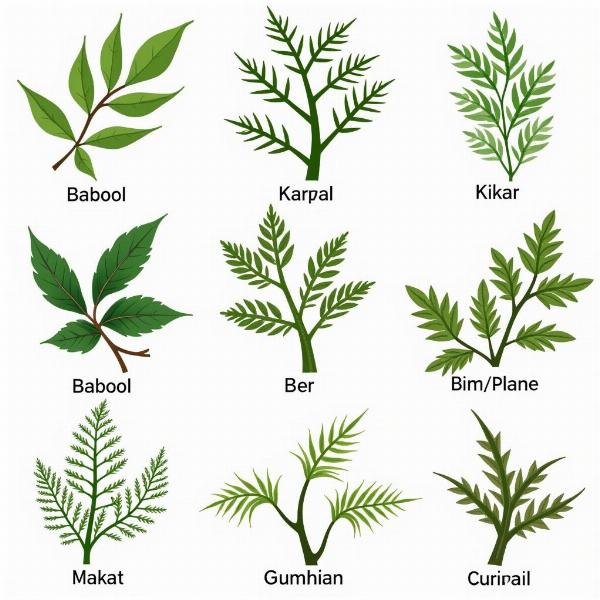Understanding the meaning of “thorny bushes” in Hindi requires more than just a simple translation. It delves into the cultural and literary nuances of the language, reflecting the significance of these plants in Indian landscapes and literature. “Thorny bushes” evokes images of resilience, protection, and even hardship, depending on the context. Let’s explore the various Hindi words used to describe these prickly plants and their deeper implications.
Decoding “Thorny Bushes” in Hindi: Exploring Various Terms
Hindi offers a rich vocabulary for describing thorny bushes, each with its own subtle connotations. The most common translation is “kaantedaar jhaadiyaan” (कांटेदार झाड़ियाँ). This term literally translates to “thorny shrubs” and is a general term encompassing various prickly plants. However, depending on the specific type of thorny bush, more precise terms might be used.
Specific Terms for Thorny Plants: Beyond the General
For instance, “babool” (बबूल) refers to the acacia tree, known for its thorns and hardy nature. “Ber” ( बेर ) refers to the Indian Jujube, a thorny shrub with small, edible fruits. “Kikar” (कीकर) represents another type of thorny acacia. These specific terms add depth and precision when discussing thorny bushes in Hindi.
 Examples of Thorny Bushes in India
Examples of Thorny Bushes in India
Cultural Significance of Thorny Bushes in India
Thorny bushes hold a significant place in Indian culture, often symbolizing resilience and protection. They are frequently mentioned in folklore, literature, and even religious texts. In rural areas, thorny bushes are used for creating fences, protecting crops and livestock from stray animals.
Thorns as Metaphors: Literature and Symbolism
In literature, thorns often represent obstacles and hardships. The ability to navigate through thorny bushes can symbolize overcoming challenges and achieving success. They can also represent the duality of life, where beauty and pain often coexist.
“Thorny Bushes” in Everyday Conversations
In everyday conversations, the term “kaantedaar jhaadiyaan” and its more specific counterparts are used to describe the physical environment, share stories, or even give directions. For example, someone might say, “The path to the temple goes through a patch of babool trees, be careful of the thorns.”
Practical Uses and Cautions
This practical usage highlights the importance of being aware of these plants and their potential to cause harm. It underscores the respect and caution that people in India often have towards the natural world.
Thorny Bushes and Their Ecological Role
Beyond their cultural significance, thorny bushes play a vital ecological role. They provide habitat for various birds and insects, contribute to soil stabilization, and even offer medicinal properties in some cases. Understanding their importance helps us appreciate the interconnectedness of nature.
Conclusion: More than Just Prickly Plants
“Thorny bushes” in Hindi encompass a rich tapestry of meanings, reflecting the linguistic, cultural, and ecological significance of these plants. From the general term “kaantedaar jhaadiyaan” to specific names like “babool” and “ber,” these words paint a vivid picture of the Indian landscape and its intricate relationship with its people.
FAQ
-
What is the most common Hindi word for “thorny bushes”? The most common word is “kaantedaar jhaadiyaan” (कांटेदार झाड़ियाँ).
-
What are some specific examples of thorny bushes in India? Examples include “babool” (acacia), “ber” (Indian Jujube), and “kikar” (another type of acacia).
-
What do thorny bushes symbolize in Indian culture? They often symbolize resilience, protection, and the overcoming of obstacles.
-
What are some practical uses of thorny bushes in India? They are commonly used for creating fences and protecting crops and livestock.
-
What is the ecological importance of thorny bushes? They provide habitat for various species, contribute to soil stabilization, and may have medicinal properties.
Meaning-Hindi.in is your premier destination for professional Hindi translation services. We specialize in various domains, including business, legal, technical, website localization, educational, and specialized translations. Our expert linguists ensure accurate, culturally sensitive translations for all your needs. Contact us today for a free quote! Email: [email protected], Phone: +91 11-4502-7584. Meaning-Hindi.in understands the nuances of both Hindi and English, making us your trusted partner for seamless communication.